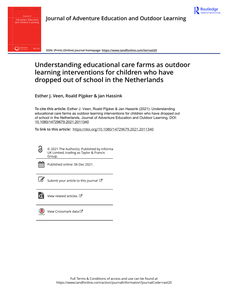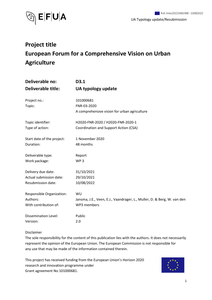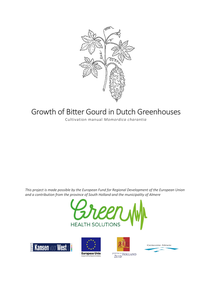Stichting Natuurlijk Genieten is a Dutch foundation, founded by Jeannette Bolck, and dedicated to stimulating the development of a more natural living environment for older people living permanently in residential care centres. Many older people, in particular with Alzheimer's, are dependent on activities and facilities, in or in the immediate surroundings, of these centres. Over the past decade Natuurlijk Genieten has taken many initiatives to bring back nature into the daily lives of older people and their carers. In this article these activities are reviewed.
DOCUMENT

Deze publicatie beschrijft de 4 jaar van het lectoraat Stedelijke Voedselvraagstukken. Dit wordt gedaan aan de hand van de vijf onderzoekslijnen die zijn ontwikkeld, door telkens de focus van de onderzoekslijn toe te lichten, en te vertellen overde projecten die we hebben gedaan, de publicaties die daaruit zijn voortgekomen, en de studenten die erbij betrokken waren.De behandelde thema's zijn: de multiculinaire voedselomgeving, de eiwittransitie, voedselverspilling, voedsel en armoede, eetgedrag en omgeving van jongeren. Het lectoraat werdgefinancierd door de gemeente Almere, dus het lectoraat bestudeerde de voedselstrategie van de gemeente. En omdat er een duidelijke link met onderzoeks- en actielab Flevo Campus was, zijn de doelen en richting van Flevo Campus ook meegenomen.
DOCUMENT

When children drop out of school, either temporarily or permanently, this poses a significant problem for both children and society. In the Netherlands, care farms offering care-education programs for school dropouts are emerging. While there is evidence for their effectiveness, models explaining how such outdoor interventions may facilitate positive developments of children and their return to school are lacking. Using the generic Context-Intervention-Mechanisms-Outcome Model as an overarching deductive frame, this study inductively examines how care-educational programs facilitate the positive development of children who have dropped out of school.
DOCUMENT

Urban Agriculture (UA) is rapidly evolving and changing and often entails more than the production of food. EFUA’s Working Package 3 therefore aims to identify the types and benefits of UA in the European context. This report is an update of the typology as described in the COST Action UAE. As existing typologies are often based on subjective observation rather than on empirical data and are also one-dimensional, this study is based on a systematic literature review about characteristics and existing typologies of UA, interviews with sixteen experts in the field representing eleven European countries and a questionnaire about specific UA initiatives amongst 112 respondents.
DOCUMENT

Bitter gourd is also called sopropo, balsam-pear, karela or bitter melon and is a member of the cucumber family (Cucurbitaceae). It is a monoecious, annual, fast-growing and herbaceous creeping plant. The wrinkled fruit of the bitter gourd is consumed as a vegetable and medicine in Asia, East Africa, South America and India. The aim of this bitter gourd cultivation manual is to make this cultivation accessible to Dutch growers and in this way be able to meet market demand. In addition, this cultivation manual aims to provide insight into the standardized production of the medicinal ingredients in the fruit.
DOCUMENT
